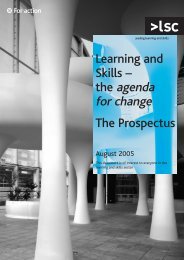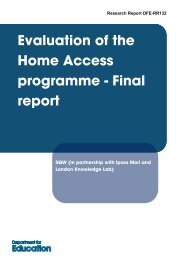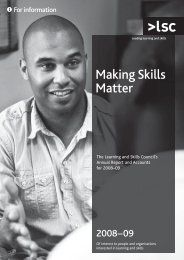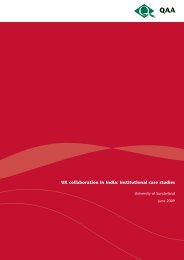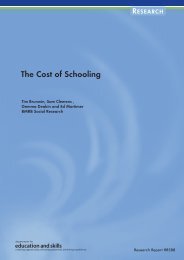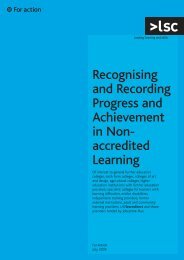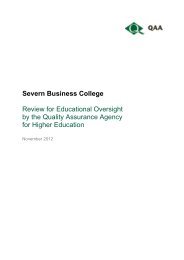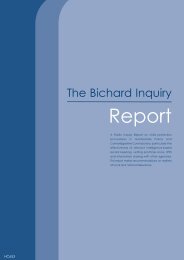National Equality and Diversity Strategy - lsc.gov.uk - Learning and ...
National Equality and Diversity Strategy - lsc.gov.uk - Learning and ...
National Equality and Diversity Strategy - lsc.gov.uk - Learning and ...
You also want an ePaper? Increase the reach of your titles
YUMPU automatically turns print PDFs into web optimized ePapers that Google loves.
ContentsParagraph Number<strong>National</strong> <strong>Equality</strong> <strong>and</strong> <strong>Diversity</strong> <strong>Strategy</strong>Widening Participation <strong>and</strong> Promoting Inclusion, 2001-2004The Law <strong>and</strong> Regulation 5High Level Objective One 12To develop the LSC as a champion of equalityHigh Level Objective Two 13Embed <strong>Equality</strong> <strong>and</strong> <strong>Diversity</strong> into all policies, programmes<strong>and</strong> actionsHigh Level Objective Three 14To develop the Council as a model equality <strong>and</strong> diversityemployer / organisationHigh Level Objective Four 15To report annually to the Secretary of Stateon progress towards equality1
<strong>National</strong> <strong>Equality</strong> <strong>and</strong> <strong>Diversity</strong> <strong>Strategy</strong>: Widening Participation <strong>and</strong> Promoting Inclusion, 2001-2004<strong>National</strong> <strong>Equality</strong> <strong>and</strong> <strong>Diversity</strong> <strong>Strategy</strong>: WideningParticipation <strong>and</strong> Promoting Inclusion, 2001-2004Vision1. The <strong>Learning</strong> <strong>and</strong> Skills Council’s(LSC’s) vision is to create a learningsociety free from discrimination <strong>and</strong>prejudice, which encourages <strong>and</strong> helps alllearners reach their full potential.Context2. The LSC is an organisation withimportant duties to make learning moreinclusive, to widen participation, identify<strong>and</strong> help stamp out unlawfuldiscrimination <strong>and</strong> promote equality ofopportunity for all learners. It willcontribute to tackling social <strong>and</strong>economic disadvantage by removingbarriers to post 16 education <strong>and</strong>training. The LSC’s commitment toequality <strong>and</strong> diversity is absolute <strong>and</strong>central to its overall mission. It makesgood business sense <strong>and</strong> will contributetowards creating a world-class workforceable to compete effectively in the 21stCentury.3. Government requires that, from theoutset, equality of opportunity isintegrated into the LSC’s culture <strong>and</strong>operations. In achieving this the LSC iscommitted to making itself a nationalequality <strong>and</strong> diversity exemplar.24. Meeting the diverse needs ofindividual learners <strong>and</strong> becoming amodel employer will be the twocornerstones of the LSC equality <strong>and</strong>diversity strategy.The Law <strong>and</strong> Regulation5. Legislation, regulation <strong>and</strong> strategyprovide a framework within which theLSC will strive to deliver equality ofopportunity for all learners, irrespectiveof their age, race, sex, religion, sexualorientation, whether or not they have adisability, learning difficulty or any othercharacteristic.6. The Race Relations (Amendment) Act2000 require public sector bodies toprepare equality schemes (action plans).The Disability Discrimination Act <strong>and</strong> theSex Discrimination Act fully apply to theLSC. The Human Rights Act 2000 also hassignificant implications in the learningcontext. The LSC will meet all regulatory<strong>and</strong> legal requirements <strong>and</strong> will beproactive in setting the st<strong>and</strong>ard <strong>and</strong>agenda for high quality education <strong>and</strong>training.7. The LSC has a statutory duty(<strong>Learning</strong> <strong>and</strong> Skills Act 2000:14) to havedue regard to the need to promoteequality of opportunity between:• people from different racial groups• men <strong>and</strong> women• people with a disability <strong>and</strong> peoplewithout.
<strong>National</strong> <strong>Equality</strong> <strong>and</strong> <strong>Diversity</strong> <strong>Strategy</strong>: Widening Participation <strong>and</strong> Promoting Inclusion, 2001-20048. The <strong>Learning</strong> <strong>and</strong> Skills Act 2000requires the LSC to report annually tothe secretary of state on:• what equality arrangements it hasmade during the preceding year• how effective the equalityarrangements were• equality <strong>and</strong> diversity plans for thefollowing year.9. The secretary of state’s remit letterto the <strong>Learning</strong> <strong>and</strong> Skills Councilhighlights the LSC’s duty to have dueregard to the needs of the growingproportion of older people in thepopulation.Delivery10. The LSC will deliver equality ofopportunity by:• mainstreaming equality <strong>and</strong>diversity in all aspects of its work• building effective partnerships withkey national, regional <strong>and</strong> localorganisations• consulting with key partners,providers <strong>and</strong> learners.11. These methods of working will becentral to achieving four high levelobjectives:• to develop the LSC as a championof equality• to embed equality <strong>and</strong> diversityinto all policies, programmes <strong>and</strong>actions• to develop the LSC as a modelequality <strong>and</strong> diversityemployer/organisation• to report annually to the secretaryof state on progress towardsequality.High Level Objective One12. To develop the LSC as a champion ofequalityThe LSC will:• designate the Chair <strong>and</strong> the ChiefExecutive as Champions for<strong>Equality</strong> at LSC <strong>and</strong> organisationlevels to promote <strong>and</strong> monitor theinternal <strong>and</strong> external focus on theissue (achieved 2001)• establish a Working Group atCouncil level with externalrepresentation to provide strategicsupport <strong>and</strong> steer for the LSC’sequality <strong>and</strong> diversity work(achieved 2001)• establish an equality <strong>and</strong> diversitystaff team to supportmainstreaming <strong>and</strong> implementpolicy (achieved 2001)• ensure that the inductionprogrammes for LSC members, theChief Executive, ExecutiveDirectors, staff <strong>and</strong> local councilmembers, <strong>and</strong> the staffdevelopment strategy, have acentral focus on achieving equality<strong>and</strong> diversity (in development)• ensure that arrangements formaking appointments to the LSCare equality-proofed (indevelopment)3
<strong>National</strong> <strong>Equality</strong> <strong>and</strong> <strong>Diversity</strong> <strong>Strategy</strong>: Widening Participation <strong>and</strong> Promoting Inclusion, 2001-2004• work with key statutory <strong>and</strong> nonstatutoryorganisations <strong>and</strong>stakeholders to ensure that policy<strong>and</strong> practice is informed <strong>and</strong>guided by the best advice <strong>and</strong>guidance available (achieved <strong>and</strong>ongoing)• consult actively with partners <strong>and</strong>stakeholders on the draft nationalequality <strong>and</strong> diversity policy <strong>and</strong>action plan <strong>and</strong> publish the agreeddocument (achieved 2001/02).High Level Objective Two13. Embed <strong>Equality</strong> <strong>and</strong> <strong>Diversity</strong>into all policies, programmes <strong>and</strong>actionsThe Council will:Data• create <strong>and</strong> use managementinformation <strong>and</strong> business systemsthat gather all appropriatecustomer data (including individualstarts, outcomes <strong>and</strong> destinations)supported by information fromprovider reviews <strong>and</strong> inspections,quality monitoring, etc; to ensuremonitoring, evaluation <strong>and</strong> reviewof equal opportunitiesperformance (to be fully in placeduring 2003/4)• establish a pilot project inpartnership with a group of localLSCs to develop <strong>and</strong> use equality<strong>and</strong> diversity impact measures aspart of strategic planning <strong>and</strong>delivery (achieved 2001). Assessthe pilot <strong>and</strong> issue formal LSCguidance on developing <strong>and</strong> usingequality <strong>and</strong> diversity impactmeasures (2002/3). Build this intothe 2002/3 national strategicplanning guidance (2002/3).Establish a national system ofequality impact measures for race,sex, age <strong>and</strong> disability (in placeduring 2002/3)• monitor <strong>and</strong> review progress onpromoting equality by examiningoutcomes for underrepresentedgroups <strong>and</strong> makerecommendations for action asnecessary (in line with reportingcycles 2001-2004)Funding• work to keep funding systemsunder review to ensure they do notdisadvantage any group of learnersor potential learners (2001 – 2003)• use development funding to helpproviders create innovativeprojects to widen participation,<strong>and</strong> improve retention <strong>and</strong>attainment amongstunderrepresented groups(ongoing)• access relevant EC fundingprogrammes to support nationaldevelopment partnerships <strong>and</strong>encourage local LSCs to similarlylead partnerships to promote newequality initiatives (2002-2004).4
<strong>National</strong> <strong>Equality</strong> <strong>and</strong> <strong>Diversity</strong> <strong>Strategy</strong>: Widening Participation <strong>and</strong> Promoting Inclusion, 2001-2004Guidance• issue guidance to local LSCs ondefining, consulting on <strong>and</strong>implementing their equality <strong>and</strong>diversity strategies <strong>and</strong> actionplans (2002/3).Learners• identify through continuingresearch, stakeholder consultation<strong>and</strong> customer feedback across allprogramme areas, key equalityissues <strong>and</strong> barriers to successfulparticipation, <strong>and</strong> strategies forpositive change at national <strong>and</strong>local levels (ongoing)• assess the impact of current <strong>and</strong>proposed LSC policies <strong>and</strong>programmes on potential learners,in particular, identifying <strong>and</strong> reshapingthose aspects of provisionwhich may disadvantage particulargroups of learners (ongoing)• develop learning programmes <strong>and</strong>materials which take into accountthe different characteristics <strong>and</strong>needs of learners from differentcultural <strong>and</strong> social backgrounds,<strong>and</strong> of learners with learningdifficulties <strong>and</strong>/or disabilities(2001-2004).Providers• work with providers <strong>and</strong> employersto help them adopt relevantst<strong>and</strong>ards, promote equality ofopportunity <strong>and</strong> take systematicsteps, including positive action, towiden participation <strong>and</strong> improveretention, to encourage peoplefrom under-represented groups toparticipate in <strong>and</strong> benefit from LSCprogrammes <strong>and</strong> initiatives(ongoing).High Level ObjectiveThree14. To develop the Council as amodel equality <strong>and</strong> diversityemployer / organisationThe Council will• designate the Human ResourceDirector as the Management Boardmember responsible for theHR/employment equality <strong>and</strong>diversity policy (achieved 2001)• designate the Quality <strong>and</strong>St<strong>and</strong>ards Director as theManagement Board memberresponsible for the service deliveryaspects of the Council’s equality<strong>and</strong> diversity policy (achieved 2001)• prepare a written equality <strong>and</strong>diversity employment policy, whichsets out a statement of theorganisation’s commitment toequality <strong>and</strong> diversity, <strong>and</strong> anaction plan showing how it willachieve it (achieved 2001/2)• secure the commitment of seniormanagement throughout the LSCto equality <strong>and</strong> diversity <strong>and</strong> takeaction to address equality issues(ongoing)5
<strong>National</strong> <strong>Equality</strong> <strong>and</strong> <strong>Diversity</strong> <strong>Strategy</strong>: Widening Participation <strong>and</strong> Promoting Inclusion, 2001-2004• consult staff on the content of theequality <strong>and</strong> diversity policy(achieved 2001)• communicate the policy to allstaff, potential employees <strong>and</strong>stakeholders (achieved 2001/2 <strong>and</strong>ongoing)• provide relevant training <strong>and</strong> staffdevelopment initiatives (ongoing)• establish the profile of LSC staff byage, sex, ethnicity <strong>and</strong> disability<strong>and</strong> take steps to ensure that theLSC profile reflects the diversity ofthe population at large (ongoing2002/3 reviewed annually)• monitor against identified targets<strong>and</strong> goals to ensure that the policyis working in practice <strong>and</strong> preparean annual report on progress(ongoing).High Level Objective Four15. To report annually to theSecretary of State on progresstowards equality.The Council will:• submit a report to the Secretary ofState summarising thearrangements made to achieveequality <strong>and</strong> diversity in all theCouncil’s work, progress <strong>and</strong> themain outcomes, barriers toachieving equality objectives, <strong>and</strong>plans for the year 2002/2003including schemes to address age,race, sex, disability <strong>and</strong> otherinequalities (annually).6
<strong>National</strong> <strong>Equality</strong> <strong>and</strong> <strong>Diversity</strong> <strong>Strategy</strong>: Widening Participation <strong>and</strong> Promoting Inclusion, 2001-2004Notes7
<strong>National</strong> <strong>Equality</strong> <strong>and</strong> <strong>Diversity</strong> <strong>Strategy</strong>: Widening Participation <strong>and</strong> Promoting Inclusion, 2001-2004Notes8
© LSC March 2002Published by the <strong>Learning</strong> <strong>and</strong> Skills Council. Extractsfrom this publication may be reproduced for noncommercialeducational or training purposes oncondition that the source is acknowledged <strong>and</strong> thefindings are not misrepresented.This publication is available in an electronic form onthe Council's website: www.<strong>lsc</strong>.<strong>gov</strong>.<strong>uk</strong>Publication enquiries: 0870 900 6800Reference MISC/0180/02



